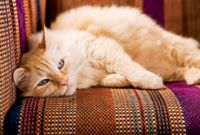OSU vets probe reasons for sick-animal behavior in healthy cats
Change of routine can actually trigger behaviors.
Columbus, Ohio — Change of routine can actually trigger behaviors normally observed with sick cats, according to a new study from The Ohio State University (OSU) College of Veterinary Medicine.
Researchers documented behaviors typically associated with sick animals, such as food refusal, frequent vomiting and litter box avoidance, in response to changes to their normal routine.

Consistency cured the cat: New research shows that cats with interstitial cystitis improve when their routines are enriched and kept consistent and that healthy cats show signs of illness when their routines are disrupted. (Marcy Maloy/Getty Images)
"For veterinary clinicians, when you have a cat that's not eating, is not using the litter box or has stuff coming up out of its mouth, the quality of environment is another cause that needs to be addressed in coming up with a diagnosis," says Dr. Tony Buffington, senior author of the study and a veterinary clinical sciences professor at OSU.
The study evolved after researchers noticed unusual behaviors among 12 healthy cats and 20 cats with interstitial cystitis (IC) at OSU's Veterinary Medical Center. Controls were put in place, and the cats were observed through a series of routine changes.
The result was new revelations about IC treatment, as well as the behaviors of healthy cats.
"This became a study of enrichment as an approach to therapy for these syndromes because there is no good drug therapy in cats, or in people, for that matter, with this disorder. What we found, in other clinical studies and with this study, is that by enriching the environment, you can reduce IC cats' syndrome burden by about 75 or 80 percent," Buffington says.
Additionally, it was noted that the routine changes had a negative effect on the healthy cats involved in the study, causing them to appear ill when they remained in normal health. Sickness behaviors in the healthy cats tripled when routines were disrupted, the study notes, with 88 percent of the sickness behaviors consisting of vomiting, urination and defecation outside of the litter box and decreased food intake.
The study recommends that when an otherwise healthy animal presents with these signs, practitioners should consider counseling pet owners on ways to enrich the cat's environment. The study suggests pet owners feed at the same time, keep litter boxes in consistent locations and offer regular playtime.
This kind of enrichment reduced sickness behaviors in the cats with IC.
"You get the environment right, and they'll recover," Buffington says. "It's like having lactose intolerance—you can't put the correction gene into the intestinal tract, but you can teach people to avoid milk sugar, and that's just as good. That's what we're doing—teaching these cats how to avoid threats that cause stress."
The study was funded by grants from that National Institute of Diabetes and Digestive and Kidney Diseases. It was published in the Jan. 1, 2011, issue of the Journal of the American Veterinary Medical Association.